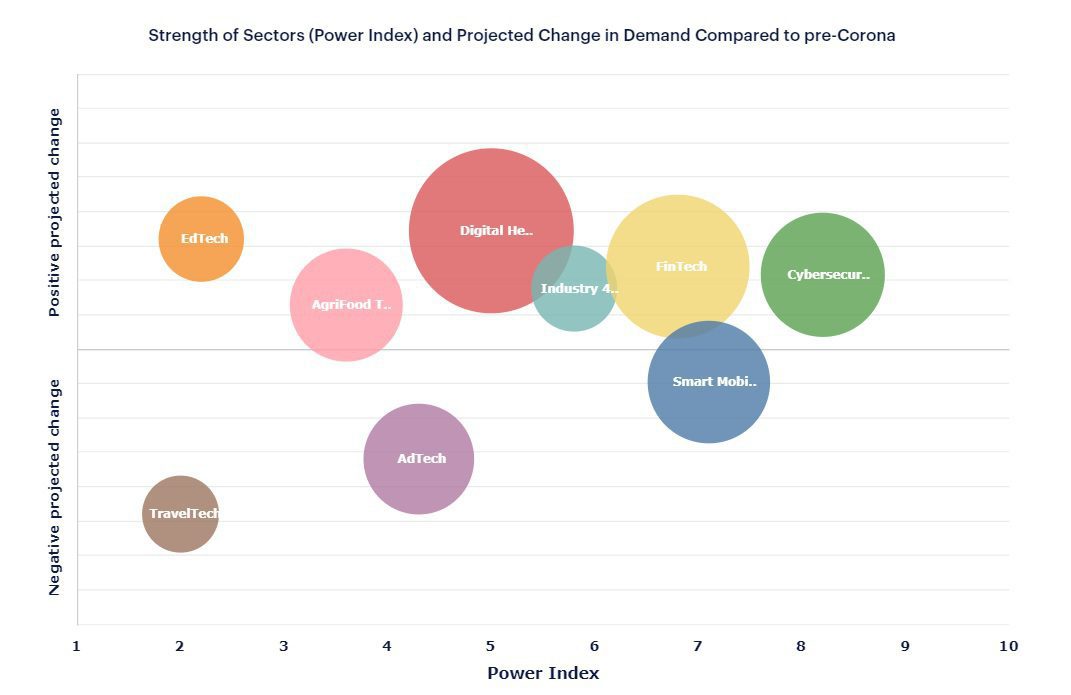By Einat Paz-Frankel, Start-Up Nation Central
What opportunities will the pandemic present to the global community? And how can Israel’s tech ecosystem help countries and corporations prepare for the new equilibrium? To address these questions and many others, Start-Up Nation Central today issued an interactive digital report entitled “The New Digital Age: How Israel’s Tech Ecosystem Can Help Shape the Post-COVID-19 Era.”
COVID-19 could be the pivotal moment heralding the true beginning of the digital age. As the world quickly adapts to the new reality — technologically and, equally important, psychologically and socially — we may find ourselves reaching a new digital equilibrium in which moving more digital bits and fewer people and goods will be the ‘new normal.’
This accelerated digitization will be reinforced by an increased need for self-sufficiency, resilience and efficiency, elements high on the agendas of countries and companies alike. Rather than standing back and watching as this ‘new normal’ unveils, forward-looking nations, industries, companies, and individuals can leverage the digital opportunities generated by the crisis in order to emerge stronger and more resilient.

Shaping the post-pandemic world
Which forces will drive the post-COVID-19 era? What opportunities will the pandemic present to the global community? And how can Israel’s tech ecosystem help countries and corporations prepare for the new equilibrium? To address these questions and many others, Start-Up Nation Central today issued an interactive digital report entitled “The New Digital Age: How Israel’s Tech Ecosystem Can Help Shape the Post-COVID-19 Era.”
According to the report, the COVID-19 pandemic presents a host of opportunities; this in-depth, multisectoral, comprehensive research report provides insights into what the new normal might look like, on a global scale, outlining the forces that will shape this transition, and highlighting the local and global opportunities this new digital age presents. In addition, it describes how Israeli solutions can meet these global challenges.
Ripple effects on society
In the new era, health restrictions, economic challenges, and trade challenges will drive businesses to prioritize resilience and self-sufficiency over rapid growth. Novel technological innovations, such as artificial intelligence, will provide many solutions to companies seeking to automate and digitize their operations.
Even after the coronavirus health crisis subsides, its ripple effects may change our individual and societal priorities and norms. Activities that were perceived as essential and irreplaceable prior to the onset of the pandemic may suddenly seem optional or even redundant.
Here are some of the major changes already underway:
- Remote work will become the new norm. This shift may have a profound effect on real estate prices, the demand for oil, investments in transportation infrastructure, and employees’ work-life balance. It also may result in better access to a remote pool of talent and greater competition among workers across regions and borders.
- Healthcare, particularly preventive care and telemedicine, will remain our top priority – nationally, and globally. The pandemic’s toll on millions of people will force many governments to prioritize the resilience of their healthcare systems, as citizens will not tolerate a similar lack of preparedness when the next pandemic hits.
- Senior citizens were hit hard by the pandemic. The social isolation that was necessary to protect them from exposure to the virus often led to loneliness, depression, and they were oftentimes met with inadequate remote medical care. The need for identifying digital and other types of solutions for this demographic is likely to become top priority.
- Like businesses, governments will also have to address the digital divide. Professionals who had access to digital infrastructure and were able to work remotely during the pandemic faced lower health risks and were not as affected by the economic crisis. This raised the issue of digital inequality, which is separate from income inequality – although both issues are related — in times of crisis. This digital divide will need to be addressed with infrastructure solutions in the areas of education, government, employment, and healthcare services.

The end of globalization?
In recent months, trade tensions have been building up in some parts of the world. The pandemic is likely to accelerate this trend, and countries will no longer treat goods the same way they did pre-pandemic, regardless of their origin. Sealed borders and other pandemic effects will drive countries to seek self-sufficiency in key industries such as pharmaceuticals, electronics, and food. This will likely result in shorter supply chains and a reorientation of world trade.
Moving manufacturing operations from a low-cost labor environment to a high-cost one will require a shift from “farther and cheaper” to “closer and smarter.” As a result, the demand for advanced industrial and supply chain management technologies is likely to rise substantially.
Opportunity for a ‘green’ recovery
The pandemic is proof that a natural disaster can come about with no warning and completely change life as we know it. Many experts believe that the effects of global warming, while broadly expected, will still come as a painful surprise sometime in this century, dwarfing the multifaceted implications of the current crisis. However, the pandemic has also shown us that large-scale changes that seemed unimaginable just a few months ago, have become completely normal and acceptable today, including climate-friendly alternatives to many of our daily activities.
Reducing commute by working remotely a few days a week might go a long way toward lowering greenhouse gas emissions. The same goes for business travel — the need to fly 5,000 miles for a two-hour meeting that can be held online seems questionable now. The combination of health restrictions, environmental concerns, and a growing need to cut costs due to the economic crisis may lead many companies to think twice before making unnecessary business trips.
To learn about the world’s most pressing challenges and needs in the wake of COVID-19, and to explore how Israel’s tech ecosystem can help shape the post-pandemic world, read our report entitled “The New Digital Age: How Israel’s Tech Ecosystem Can Help Shape the Post-COVID-19 Era.”
